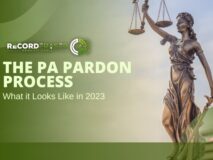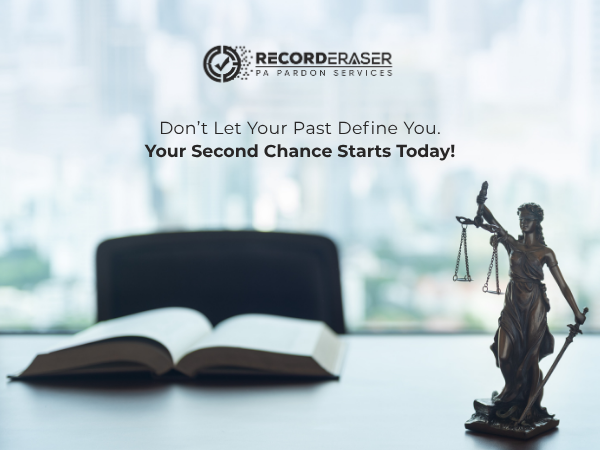
Getting a pardon to clear your criminal record may be difficult, depending on the charges and the circumstances surrounding them, but it is possible.
People seek pardons to clear their misdemeanor and felony convictions, which may affect their current way of life. Even minor offenses can be hindrances. However, minor and major offenses still go through a comprehensive pardon process, which takes quite a while. Here is a closer look at the PA pardon process and why it can take so long to complete.
How Long Does the Pardon Process Take?
Getting a pardon can take two years or more, assuming you file an application correctly. This time is significantly faster than it used to be. For context, the pardon process used to take between four and five years. However, the Board of Pardons in the past five years the process has trimmed the time to 2 – 2 1/2 years. Also the Board implemented an expedited process for marijuana cases which can be reviewed in a year, cutting the application process time to a year.
Most of the waiting time involved in the pardon process requires applicants to wait for their turn to be interviewed. They also undergo a comprehensive background investigation under a state parole agent. Unless the board determines that they can expedite an application, the applicant will go through the regular pardon process that currently takes two years or more.
Board Members Involved in the Pardon Process
Another reason the PA pardon process takes a long time is that the board is composed of five people. These officials will get together only a couple of times every other month. The members of the Pennsylvania Board of Pardons include:
- Lieutenant Governor
- Attorney General
- Corrections Expert
- Psychiatrist
- Victim Representative
What Happens in Pennsylvania Board of Pardons Meetings?
In board meetings, the Boardmembers review hundreds of applications. Applicants file their requests for a pardon, and the board will prepare to review it. They will work it up, investigate it, and then the applicant will take their place in line waiting for voting and an interview.
There is no way to speed up the pardon process. The board may reconsider marijuana charges. They will try to review such cases in as little as a year, but it will still go through standard procedures.
What Is the Process for Applying For A Pardon In PA?
Filing an application for the pardon process involves three primary steps, which we will do for you:
- Collect Court Documents: We request relevant court documents including a criminal complaint, affidavit of probable cause, criminal information or indictment, final plea or verdict, sentencing order, and proof of payment of financial obligations.
- Fill Out An Application: Generally, we will provide information about how and why the crime occurred, and give a statement about why you are a good candidate. We will read and answer all relevant fields as clearly as possible and ask you to sign after you review it.
- Submit Your Application: We will mail your application packet containing all relevant documents and send you a copy of everything we submit.
Who Should Apply for the PA Pardon Process?
Anyone with a misdemeanor or felony conviction should seek a pardon. You can browse Pennsylvania’s Unified Judicial System (UJA) to see what’s on your record. You can use the UJS portal to determine whether you are a good candidate for a pardon based on the information you find.
Generally, eligibility criteria involve three factors:
- Reason for the Crime: Your story will help determine whether you are a good candidate for a pardon. You must have a good reason for why you committed the crime.
- Post-crime Life: What have you done after you committed the crime can help sway the board in your favor? You must prove that you have done better things with your life since the crime.
- Effects of Your Record: Detailing how your criminal record is holding you back can tell if you deserve a pardon. Perhaps your record is preventing you from getting a job in a field of your strength.
The board weighs the severity of the offense against the amount of time that has gone by and your explanation for what happened. That is what they base their votes on. You may have better chances of getting pardoned if you have at least five or ten years to show that you’ve turned your life around since the criminal offense.
Even if you apply for a pardon, you will not automatically get a hearing. Likewise, you can rest assured that the board will not automatically deny your application. You must get at least two out of five votes from the board to proceed. Otherwise, you must ask again after a year.
What Happens Next?
Approved pardon applications will go through an interview process with the Board of Pardons. Since the pandemic and the pardon process revamp under Lieutenant-Governor Fetterman, the interview process for most public reviews usually starts with an opening request.
The Board of Pardons will ask if you yield your time to the board so they can ask you questions. As the applicant, you must answer, “Yes, I do.” The Board of Pardons will then ask you questions about your case.
For instance, in a criminal case involving drug use, some board members will ask about how the applicant got sober. They will also ask how and when they got clean and about their plans for maintaining sobriety.
The best interview scenario is when all board members will have no questions. In that case, you successfully convinced them of your need for a pardon.
Background Investigation
After an interview with the Board of Pardons, a parole officer will send a letter and call you. They will say there are things they will want to discuss with you. You will have a couple of weeks to prepare the information they seek.
Generally, they will want to know your financial situation. Specifically, they will check whether or not you are employed, if you are married, whether you rent or own your house, and who you are living with.
With a legal representative from Record Eraser on your side, you can have a professional call you, sit down with you and go over the requirements. You can be sure that you will be ready as soon as you complete your interview with the board.
Governor Overrule
The governor can ignore the recommendation of the Board of Pardons if he remains unconvinced of the applicant’s case. Consider getting input from an experienced trial room attorney to review your record. These legal experts specialize in helping people clear their criminal records through the use of pardons and expungements.
Final Words: Know What’s on Your Criminal Record
The PA pardon process is time-consuming for everyone because of the comprehensive process for determining whether you deserve the pardon you seek. To save time, you need to know what’s on your record. Criminal record research is critical in understanding what you can be cleared and when, through the use of pardons and expungements.
You may need expert help. Speak with an experienced pardon lawyer to find your record and determine what can be cleared.



